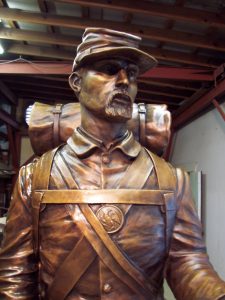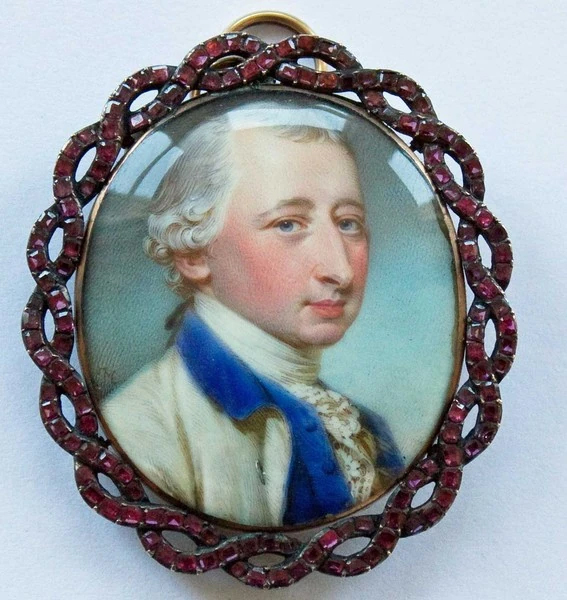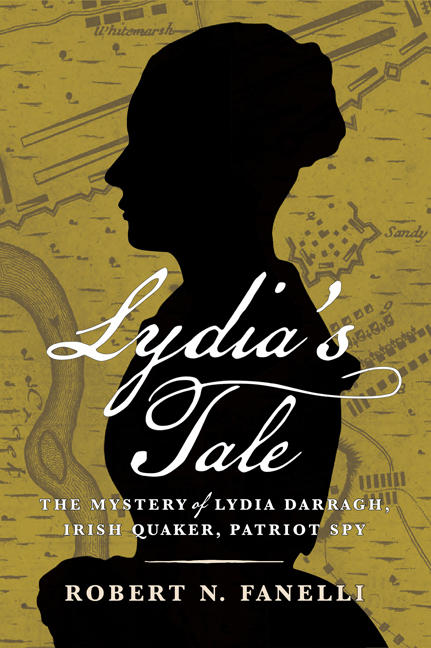About Joshua Shepherd
Joshua Shepherd, a sculptor and freelance writer, has created over 20 public monuments. His articles, with a special focus on Revolutionary and frontier America, have appeared in publications including MHQ: The Quarterly Journal of Military History, Military Heritage, Muzzle Blasts, and The Artilleryman. He lives in rural Indiana with his wife and children.
What inspired you to start researching and writing about the Revolution?
My parents and older brothers helped instill a love of history and books at a young age, and having grown up in rural Indiana, I’ve always been fascinated by the early frontier. A focus on the Revolution really took off when I was a teenager working a summer construction job. During lunch breaks, I’d sit in the shade and read a ragged copy of George Scheer and Hugh Rankin’s Rebels and Redcoats. Its heavy dose of first-person accounts made it one of the most engaging books I’d ever read, and the authors did a good job of capturing the epic sweep of the Revolution.
What historians have most influenced your work? Why?
When it comes to the Revolution, it would have to be Thomas Fleming. His enthusiasm for his subject matter is contagious, and he steers clear of here-today-gone-tomorrow academic trends. For example, it’s become something of a fad for some folks to dismiss George Washington as a two-bit nincompoop who fell backwards into success. In a recent JAR interview series, I couldn’t help but enjoy Fleming’s laconic dismissal of such sentiments. He’s as fine a historical author as there is. Favorite volume? Washington’s Secret War. If you haven’t read it, do yourself a favor and pick up a copy.
What are your go-to research resources?
It’s quite difficult for a bibliophile to admit, but the internet has unquestionably revolutionized access to primary materials. Some of the most valuable gems are the multi-volume series of documents which were put out by most state historical societies during the late nineteenth century. For researching the war out west, the series from Virginia, Illinois, Michigan, and North Carolina have been particularly helpful. Another great set published by the Wisconsin Historical Society is composed of printed selections from the Draper Manuscripts. The diaries, correspondence, and order books that are available on sites such as Hathi Trust, Archive.org, and Founders Online are simply indispensable … but I’d still rather get my hands on an actual book.
Which of your own JAR articles is your favorite or most rewarding? Why?
“His Majesty’s Indian Allies” covered a topic that’s a personal favorite, but the most rewarding might have been “Temper, Temper: Officers and Gentlemen Go Berserk,” primarily because it seems to have given a laugh to a few folks.
Other than your own contributions, what are some of your favorite JAR articles?
At the risk of leaving so many fine authors and articles unmentioned, a few immediately come to mind: Wayne Lynch’s piece on James Dunlap, Todd Braisted on the wreck of the Martha, and J.L. Bell on Samuel Adams’ recruiting methods.
What books about the American Revolution would you recommend?
There are some old standbys that everyone with even a passing interest in the war should read: the aforementioned Rebels and Redcoats by Scheer and Rankin, David Hackett Fischer’s Paul Revere’s Ride and Washington’s Crossing, and John Buchanan’s The Road to Guilford Courthouse. For a volume that doesn’t get near the attention, but ought to, I’d suggest Glenn Williams’ Year of the Hangman: George Washington’s Campaign Against the Iroquois. With the insight that only a military historian could bring to the topic, Williams handily dispenses with the long-held opinion that Sullivan’s campaign was an utter failure.
What new research/writing projects are you currently working on?
I regularly contribute material with a colonial/revolutionary theme to historical and black powder hunting publications. For JAR, there’s an article in the works that covers an obscure young woman who, by any measure, can only be described as a heroine. The project I’m currently most excited about is a biographical piece on Delaware’s Captain Robert Kirkwood. He was one of the most reliable company-grade officers in the Continental Army and rendered seven years of hard service with little recognition. He died as he lived – doing his duty – and met a grisly end in the wilderness; oddly enough, just a stone’s throw from where I’m now raising my family. He’s nearly forgotten and doesn’t have a proper grave, but deserves to be remembered.
What other hobbies and interests do you enjoy?

Sculpture, naturally, takes up the bulk of my time. I’ve been blessed to help memorialize the veterans of almost every conflict from the Civil War to Iraq, but I’m still waiting for a Revolutionary War commission. More than anything, though, the most enjoyment comes from spending time with my incomparable wife and wonderful children.
Why is Journal of the American Revolution important to you?
Todd Andrlik, Don Hagist, and Hugh Harrington have done an immeasurable service for Revolutionary War enthusiasts. Prior to JAR, there was simply no periodical with any longevity that we could call our own. The author pool is composed of writers that are far more qualified than I am, and the Journal’s broad reach brings a wealth of regional knowledge that, individually, we would never have the time to acquire. Whether you’re interested in the northern theater, revolutionary Boston, the rough and tumble southern backcountry, loyalists, diplomacy, or intelligence, there are several authors who specialize in each topic and kindly share their knowledge.
Is there an article, or subject area, that you would like to see appear in JAR?
Battle studies. At first thought that genre seems to have been done to death already, but JAR authors always seem to have a way to tease more information out of primary sources. For Civil War or World War II enthusiasts, there’s no shortage of this sort of material. Although it’s more difficult because of the relative lack of first person accounts, it would be nice to see more authors do the same for the Revolution.
Is there a way that JAR could be improved?
I really don’t see how the format could be improved; JAR is simply the best historical website that there is. But perhaps how the site is used could be given a second thought. Once in a great while the comments section sees a bit of unpleasant snippiness. That’s really not helpful. All of us, from university professors to sixth graders writing a paper, are perpetually in the process of learning. Taking learning and truth seriously is commendable; taking ourselves too seriously, not so much. Let’s be neighborly, folks; a merry heart doeth good like a medicine.








One thought on “Contributor Close-up: Joshua Shepherd”
Nice article, Joshua. You do incredible work, very nice indeed.
Gary